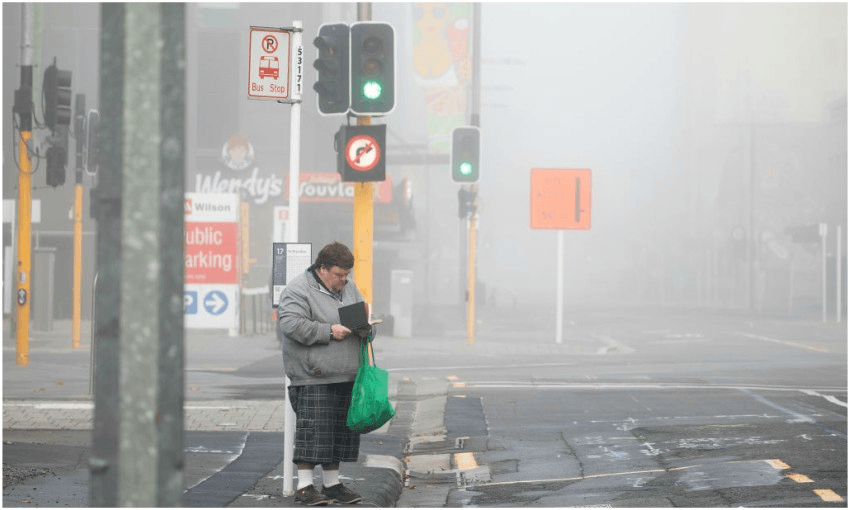When Elizabeth Heritage forgot how to read, poetry brought her back.
This is the story of my reading of Funkhaus, the new poetry collection by Hinemoana Baker (Ngāi Tahu, Ngāti Raukawa, Ngāti Toa, Te Āti Awa) writing from Berlin. I sing of fear and confusion: mine not Baker’s.
Let me start with my favourite poem from Funkhaus, which I reproduce here in full.
I have no retirement plan
But I have a new vacuum cleaner.
It’s a Dirt Devil. I feel so ashamed but
I stagger on, hero on the boil
shoe without a heel, house without ribs.
When I think of the next fifteen years
it’s almost as if I were thinking about the next
fifteen dust bunnies: flat as a lambskin
a stoat-grey snow.
But also proud! Proud as a pencil!
This purchase works! Look at us moving
together like wheels, pedalling it all
into memory, into money!
It’s almost as if I were thinking.
Hero with a Dirt Devil.
I feel so on the boil.
It’s so funny! I love how the title functions as the first line, and the ridiculous comparison of future financial security with a new household appliance. It’s funny but it’s also frightening, knowing that you could be destitute in your old age. Even if you did have savings, there could be another global financial crisis that wipes them out. And if there’s one thing 2020 has taught us it’s that planning for the future makes fools of us all. So you may as well be proud of your vacuum cleaner – proud as a pencil.
There are a few poems in Funkhaus that I only understood after I’d read the notes at the back of the pukapuka and learned about the context. For example, ‘If I Had to Sing’ was written for the post-quake reopening of an art gallery in Ōtautahi. This explains the lines:
I have no idea what to call this rebirth
and yet I’m here to name it
…
Does a thing which is reborn
need to have died?
It is the rebirth of an institution/building, not a person. And it didn’t die per se, it was damaged and needed to close for a while for repairs. I get it now. OK. I can do this.
The thing that kept bothering me as I read Funkhaus was my own anxiety: why am I insisting so strongly on literal meaning? He toikupu tēnei / this is poetry. Poetry is meant to do new and interesting things with language – in fact Baker has clearly told me that’s what she’s doing (also from ‘If I Had to Sing’):
Language is a flute, a lily,
a chair overbalancing,
a church we teeter
on the threshold of
I used to be able to handle the teetering – I used to enjoy it. What’s changed?
It’s the pandemic. Over the past months I have become dependent on language that is forceful, literal and logistical; a repeated series of short, clear commands. Stay home, save lives. Wash your hands. Self-isolate. Stick to your bubble. I have obeyed the language of the state and I have achieved a feeling of safety by believing in the mountainous, singular importance of that language. But in that process I have lost something.
I read Funkhaus again, trying to recapture the part of myself that responds to toikupu, that can read strange twisty turns of phrase without panicking. But – but – how can I obey the poems if I don’t know what they’re telling me to do?
So I start small. If I can’t manage a whole pukapuka or even a whole poem I will go line by line until I relocate my own ability to read. Here are some of Baker’s toikupu that I loved because I was able to hear them and experience their teetering with joy.
From ‘If I Had to Sing’:
the planet
carves its own seismic
trench in the solar system.
From ‘Flohmarkt’:
The kind of chair you never want
to get up out of
the kind of chair for which
prepositions were invented.
From ‘Narcissist at Lunch’:
Yes even my fingerprints
Want my autograph
From ‘Waiata Tangi’:
Only one third of the vase
of my body
is filled with water today.
From ‘Knee, Throat’:
In the distance a smear of penguin
or land
A smear of penguin! Proud as a pencil! Baker is rescuing me. “Funkhaus” is German; it means broadcasting studio: through a fog of static I am finally starting to receive transmission. As a parting gift Baker has even given me the kupu to express my own pandemic-muddled yearning.
From ‘Waitangi Day’:
Oh Language you soccer fan I still long for you
even after everything we’ve been through.
Ngā mihi nui ki a koe, Hinemoana.
Funkhaus by Hinemoana Baker (Victoria University Press, $25) is available from Unity Books Wellington and Auckland.



